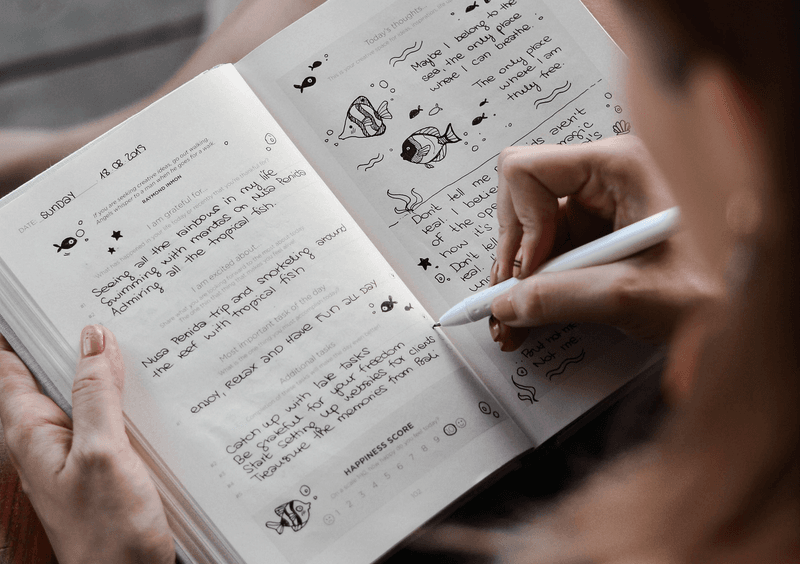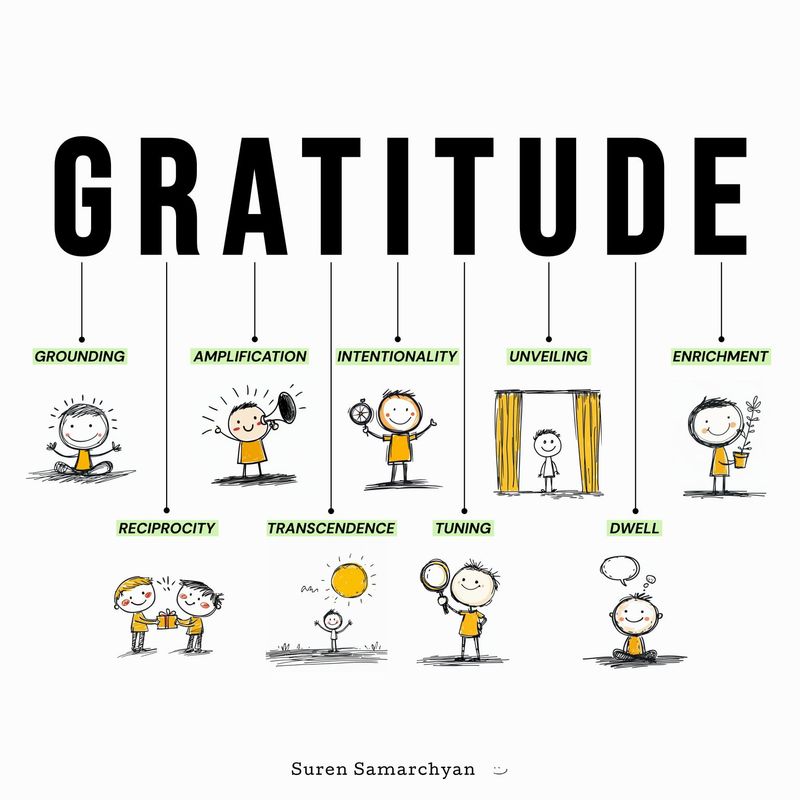18 Micro-Habits Of People Who Stay Calm & Balanced No Matter What
Staying calm and balanced in a fast-paced world is an art refined through small, consistent habits. These micro-habits are the backbone of emotional resilience, allowing individuals to navigate life’s challenges with grace. Discover the power of these practices, each offering a unique path to tranquility and balance.
1. Taking a few deep breaths before reacting

Before reacting, taking a few deep breaths can transform a tense situation into a more manageable one. It serves as a pause button, allowing the mind to reset and emotions to settle. This small act can prevent impulsive reactions and promote thoughtful responses. In stressful moments, the breath is our anchor, grounding us in the present.
Research shows that deep breathing activates the parasympathetic nervous system, reducing stress and anxiety. Practicing this regularly can enhance patience and empathy, turning potential confrontations into opportunities for understanding. It’s a simple yet profound tool for maintaining emotional balance.
Imagine the calm that follows: a moment of clarity, where solutions become more apparent, and peace reigns over chaos.
2. Keeping their phone on silent during meals

Keeping the phone on silent during meals fosters deeper connections and mindfulness. It’s an opportunity to engage fully with those present, savoring both the food and the company. By eliminating digital interruptions, meals become a sacred space for conversation and grounding.
This habit encourages mindful eating, enhancing the dining experience and promoting better digestion. The absence of phone distractions allows individuals to listen more intently and communicate more openly, strengthening relationships.
The ripple effect of this practice is profound, creating a more harmonious home environment. Embracing this habit can transform ordinary meals into cherished moments of connection and calm.
3. Saying “no” without overexplaining

Saying “no” is an empowering micro-habit that fosters personal boundaries and self-respect. By doing so without overexplaining, individuals assert their needs with confidence and clarity. This practice is not about rejection but about valuing one’s time and energy.
In a world that often equates busyness with success, the ability to decline gracefully is a powerful skill. It allows people to prioritize what truly matters and avoid overcommitting themselves. This assertiveness leads to reduced stress and increased satisfaction.
Every “no” is a “yes” to something more meaningful, creating space for personal growth and contentment. It’s a small word with a big impact on maintaining balance and focus.
4. Drinking water first thing every morning

Starting the day with a glass of water is a refreshing and simple habit that energizes the body. Hydration upon waking kickstarts metabolism and aids in flushing out toxins accumulated overnight. This act is a gentle nudge towards healthier daily routines.
Water is essential for cognitive function, and this morning ritual can improve alertness and concentration. It’s a moment of self-care that sets a positive tone for the day ahead, reinforcing the body-mind connection.
Embracing this habit can lead to better hydration throughout the day, enhancing overall well-being. A small act of kindness to oneself that speaks volumes about dedication to health and balance.
5. Scheduling quiet time daily—even 10 minutes

Incorporating daily quiet time provides a sanctuary from life’s noise, even if just for 10 minutes. This dedicated period allows the mind to unwind and recharge, fostering a sense of peace and clarity. It’s an opportunity to reflect, meditate, or simply be present.
Regular quiet time can enhance creativity and problem-solving skills, offering a mental reset that promotes productivity. It’s a pause that refreshes, nurturing a deeper connection with oneself and the world.
This simple practice can transform the day, turning chaos into calm and stress into serenity. It’s a small investment with significant returns in mental and emotional well-being.
6. Writing down thoughts to clear mental clutter

Writing down thoughts is a powerful way to declutter the mind and gain perspective. This act of journaling allows emotions and ideas to be expressed freely, reducing mental noise and facilitating clarity.
Putting pen to paper can uncover hidden patterns and insights, promoting self-awareness and growth. It’s a therapeutic process that enhances emotional intelligence and resilience.
Regular journaling serves as a mirror, reflecting the inner landscape and guiding personal evolution. It’s a gentle companion on the journey to balance, offering solace and understanding in times of uncertainty.
7. Pausing before replying to heated messages

Pausing before responding to heated messages is a practice of patience and wisdom. It allows emotions to cool down and reason to take the lead, preventing regrettable reactions. This pause creates space for empathy and understanding, turning potential conflicts into diplomatic exchanges.
By stepping back, individuals gain perspective and can craft responses that reflect their true intentions. It’s an exercise in self-control that fosters respectful communication and strengthens relationships.
This habit transforms digital interactions, ensuring they remain constructive and positive. A small pause makes a big difference in maintaining harmony and respect in both personal and professional spheres.
8. Keeping clutter out of their living space

A clutter-free living space is a sanctuary for the mind and soul. Removing unnecessary items creates an environment of calm and clarity, allowing energy to flow freely. It’s about making intentional choices that reflect one’s values and aspirations.
Decluttering reduces stress and enhances focus, providing a canvas for creativity and relaxation. It invites order and simplicity, transforming chaos into tranquility.
Embracing a minimalist lifestyle fosters mental clarity and emotional well-being, showcasing the beauty of simplicity. It’s a reflection of inner peace, turning the home into a haven of balance and inspiration.
9. Moving their body for 15 minutes a day

Moving the body for just 15 minutes a day is a celebration of vitality and health. This short burst of activity can elevate mood, boost energy, and enhance overall well-being. Whether it’s a brisk walk, stretching, or dancing, movement is medicine.
Regular physical activity strengthens the connection between body and mind, promoting resilience and focus. It’s a joyful expression of life, a reminder of the body’s capabilities and strength.
This habit ignites motivation and fosters a positive outlook, turning a small effort into significant rewards. It’s an invitation to embrace life fully, with vigor and enthusiasm.
10. Practicing gratitude in small ways

Practicing gratitude in small ways enriches life with positivity and appreciation. This habit involves acknowledging the little things that bring joy, turning mundane moments into celebrations of abundance.
Gratitude shifts focus from what is lacking to what is present, fostering contentment and happiness. It’s a powerful tool for transforming challenges into opportunities for growth and learning.
A grateful heart is a magnet for joy, attracting more reasons to feel thankful. This practice creates a ripple effect, spreading positivity and kindness in the world, nurturing both inner peace and external harmony.
11. Going outside for natural light daily

Spending time outdoors for natural light is a gentle way to boost mood and energy. Sunlight nourishes the soul, providing essential vitamin D and enhancing overall well-being.
This habit connects individuals with nature, fostering a sense of belonging and tranquility. It encourages mindfulness, turning a simple walk into a meditative experience. The natural world offers a soothing backdrop, inviting reflection and relaxation.
Embracing the outdoors revitalizes the spirit, creating a harmonious balance between the inner self and the world. It’s a reminder of life’s simple pleasures and the beauty that surrounds us.
12. Avoiding people who drain their energy

Choosing to avoid people who drain energy is an act of self-preservation and empowerment. It involves recognizing relationships that deplete rather than enrich, and making conscious choices to protect one’s well-being.
This habit fosters a supportive environment, where positivity and encouragement thrive. By surrounding oneself with uplifting individuals, energy is conserved for meaningful interactions and growth.
Creating boundaries with energy-draining people strengthens resilience and promotes a balanced, harmonious life. It’s an affirmation of self-worth and a commitment to nurturing positive connections that inspire and uplift.
13. Setting boundaries without guilt

Setting boundaries without guilt is a profound act of self-care and respect. It involves clearly communicating personal limits and needs, fostering healthier relationships and self-awareness.
Boundaries are essential for maintaining balance and protecting one’s energy. They enable individuals to prioritize their well-being without feeling burdened by guilt or obligation.
This practice empowers people to live authentically, respecting themselves and others. It’s a dance of give and take, where harmony and mutual respect thrive, creating a foundation for fulfilling interactions and personal growth.
14. Limiting news and social media consumption

Limiting news and social media consumption is a mindful choice to protect mental health. In an age of information overload, this habit creates space for peace and focus, reducing anxiety and stress.
By curating what information is consumed, individuals regain control over their emotional landscape. It encourages presence and engagement with the real world, fostering deeper connections and understanding.
This practice promotes a balanced relationship with technology, where it’s used as a tool rather than a distraction. It’s a reminder to savor life offline, nurturing a sense of calm and clarity amidst the digital noise.
15. Focusing on one task at a time

Focusing on one task at a time cultivates deep concentration and efficiency. This practice is an antidote to the chaos of multitasking, allowing individuals to engage fully with the task at hand.
By dedicating attention to a single task, quality and creativity are enhanced, leading to more satisfying outcomes. It fosters a sense of achievement and progress, making work a more enjoyable experience.
This habit nurtures patience and mindfulness, turning daily tasks into purposeful activities. It’s a commitment to excellence and presence, enhancing both productivity and well-being.
16. Smiling at strangers to shift their mood

Smiling at strangers is a simple act that can shift the mood and brighten someone’s day. It’s a universal language of kindness and warmth, creating connections even in fleeting moments.
This habit spreads positivity and can transform a mundane interaction into a memorable exchange. It encourages empathy and understanding, reminding us of our shared humanity.
A smile is a gift that costs nothing yet enriches both the giver and receiver. It’s a ripple of joy that can inspire more smiles, fostering a community of kindness and compassion.
17. Checking in with their emotions daily

Checking in with emotions daily is a practice of self-awareness and emotional intelligence. It involves taking a moment to reflect on feelings and moods, gaining insights into one’s inner world.
This habit fosters emotional balance and resilience, allowing individuals to navigate challenges with grace. By understanding emotions, we can respond rather than react, cultivating healthier relationships and self-compassion.
Regular emotional check-ins strengthen the connection between mind and heart, promoting a harmonious and fulfilling life. It’s a gentle reminder to honor one’s emotional landscape, creating space for growth and healing.
18. Ending the day with a simple relaxation ritual

Ending the day with a relaxation ritual is a nurturing practice that signals the body to unwind and prepare for rest. Whether it’s sipping herbal tea, reading, or meditating, this practice fosters a peaceful transition from day to night.
Relaxation rituals soothe the mind and body, promoting restful sleep and rejuvenation. They serve as a gentle reminder to slow down and savor the quiet moments before bedtime.
This habit enhances overall well-being, turning the end of the day into a cherished time of reflection and tranquility. It’s a celebration of rest, inviting serenity into the evening hours.







